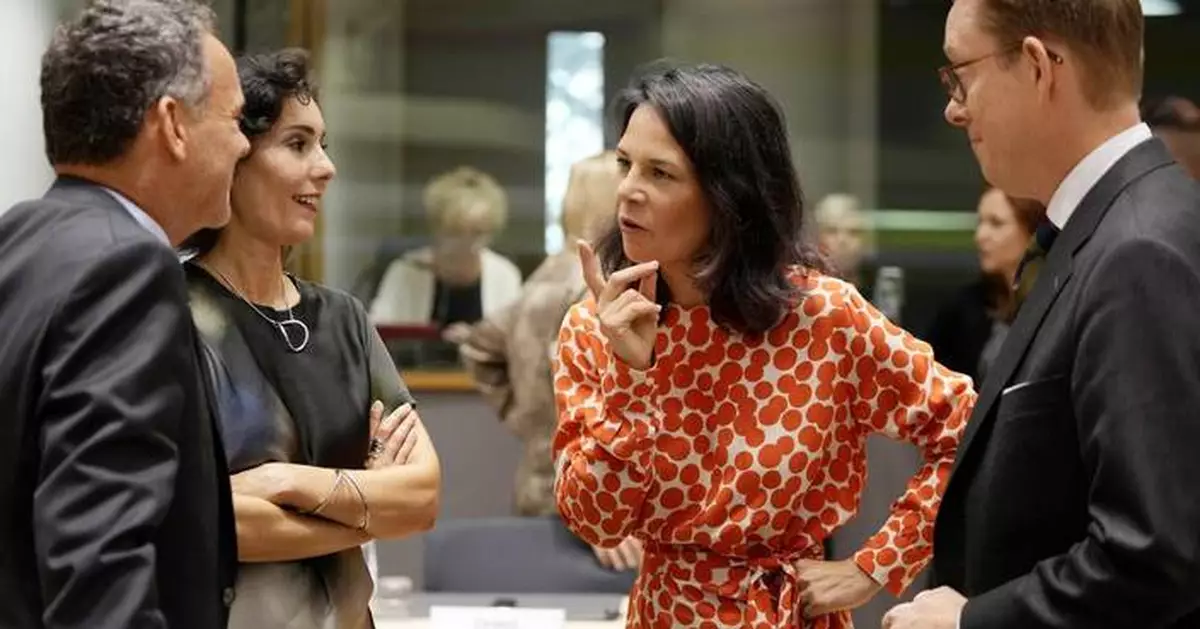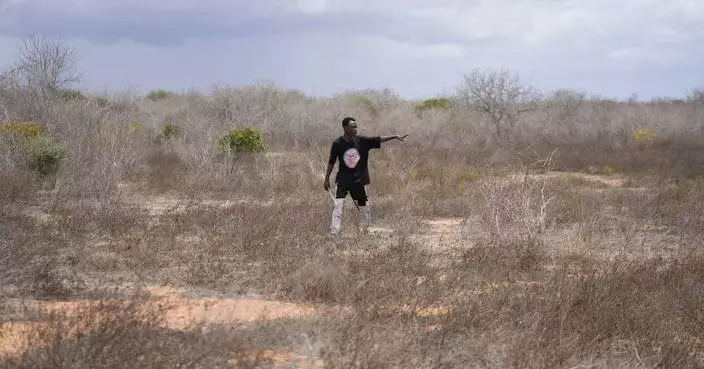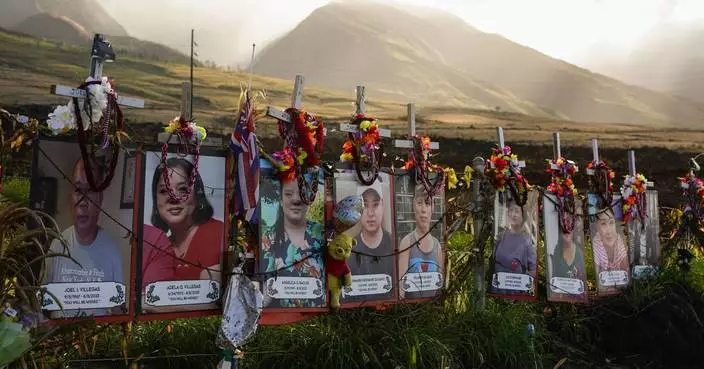BRUSSELS (AP) — The European Union must rethink its relations with Israel as the death toll mounts in Gaza and the West Bank and impose sanctions on some Israeli government ministers accused of fomenting racial hatred, Ireland and the bloc’s top diplomat said Thursday.
At a meeting of EU foreign ministers in Brussels, Ireland’s foreign minister accused Israel of deliberately targeting civilians as well as Hamas militants with the military campaign it launched almost 11 months ago.
“This is a war against Palestinians not just against Hamas. The level of civilian casualties and dead is unconscionable,” Micheal Martin told reporters. “It’s a war on the population. No point in trying to fudge this.”
Israel’s offensive in Gaza has killed over 40,000 people, according to local health officials, displaced 90% of the population and destroyed its main cities. Hamas has lost thousands of fighters and much of its militant infrastructure.
Violence has also surged in the West Bank since Hamas’ Oct. 7 attack inside southern Israel ignited the war there. Israel launched a large-scale operation in the West Bank this week, in which Hamas said 10 of its fighters were killed in different locations.
Martin said a legal opinion issued by the International Court of Justice that Israel’s occupation of Gaza and the West Bank is unlawful obliges the EU to take action. The Palestinians have hailed it as “a watershed moment for Palestine, for justice and for international law.”
“It cannot be business as usual,” Martin told reporters. “It is very clear to us that international humanitarian law has been broken.”
Ties between the EU and Israel – which are major trading partners – are governed by a so-called Association Agreement. Ireland and Spain have been pressing their EU partners to examine whether Israel has broken the rules.
The EU is the world’s top provider of aid to the Palestinians but holds little leverage over Israel, notably because the 27 member countries are deeply divided in their approach.
Austria, Germany and Hungary are staunch backers of Israel, while Ireland and Spain are more vocal in their support for the Palestinians. Nonetheless, the bloc does have credibility as a European project founded on peace.
EU foreign policy chief Josep Borrell, with the backing of Ireland, urged the ministers to consider imposing sanctions on certain members of Prime Minister Benjamin Netanyahu’s right-wing cabinet over their remarks about the war in Gaza.
“Some Israeli ministers have been launching hateful messages, unacceptable hateful messages, against the Palestinians and proposing things that go clearly against international law and is an (incitement) to commit more crimes,” Borrell said.
Borrell did not name the ministers, but earlier this month he criticized Israel's Finance Minister Bezalel Smotrich for suggesting that the starvation of Gaza’s population of more than 2 million people “might be just and moral” until hostages captured in the Oct. 7 attack are returned home.
Borrell said there should be “no taboos” to prevent the EU from ensuring that international humanitarian law is respected.
German Foreign Minister Annalena Baerbock did not take a clear stand either way, saying only that things should be examined carefully on a case-by-case basis to assess “what are the allegations? Are these allegations enough to list to sanction?”
She underlined that any decision to impose sanctions would require unanimous support.
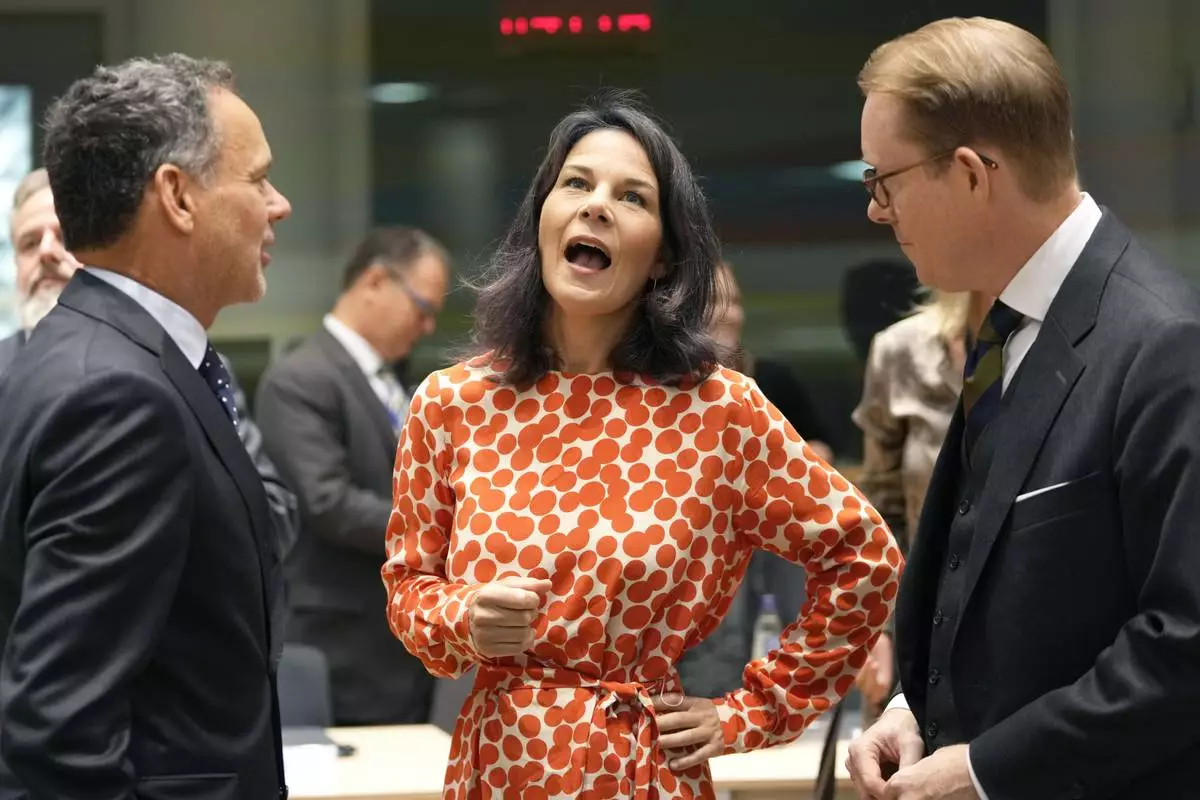
Germany's Foreign Minister Annalena Baerbock, center, speaks with Netherlands' Foreign Minister Caspar Veldkamp, left, and Sweden's Foreign Minister Tobias Billstrom during a meeting of EU foreign ministers at the European Council building in Brussels, Thursday, Aug. 29, 2024. (AP Photo/Virginia Mayo)
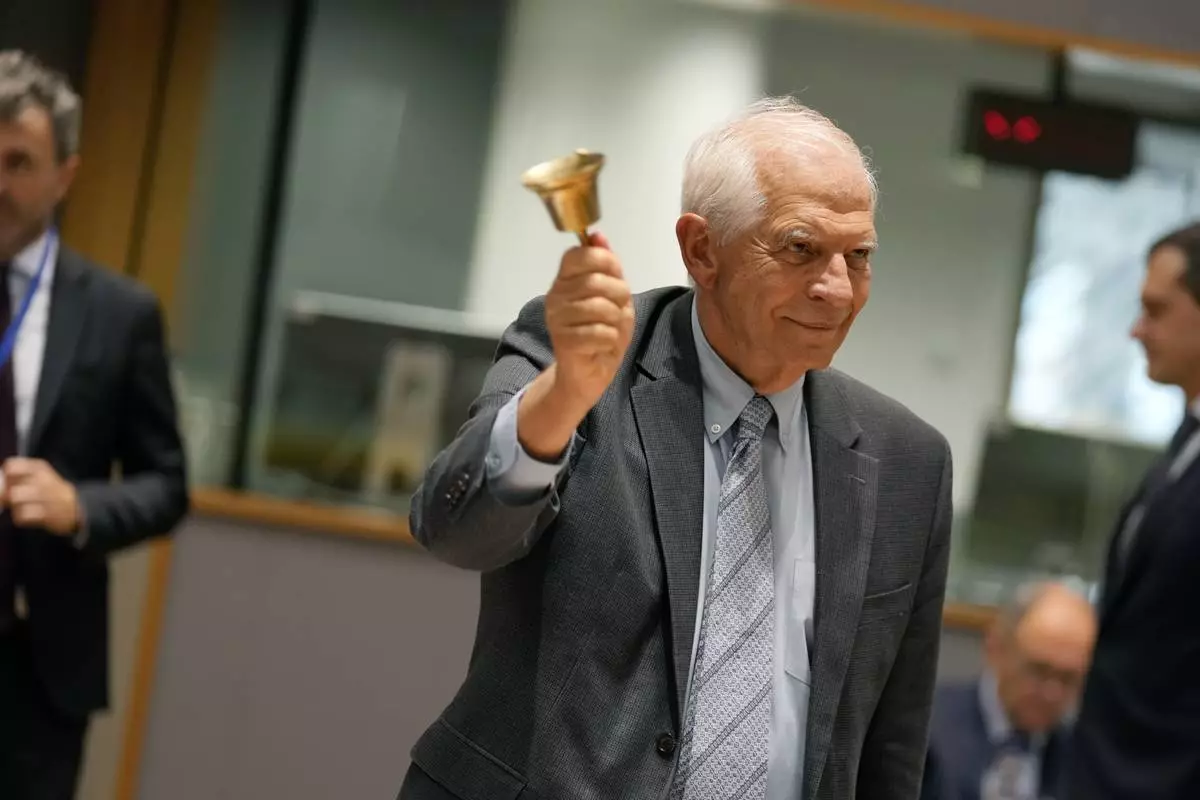
European Union foreign policy chief Josep Borrell rings a bell to signify the start of a meeting of EU foreign ministers at the European Council building in Brussels, Thursday, Aug. 29, 2024. (AP Photo/Virginia Mayo)
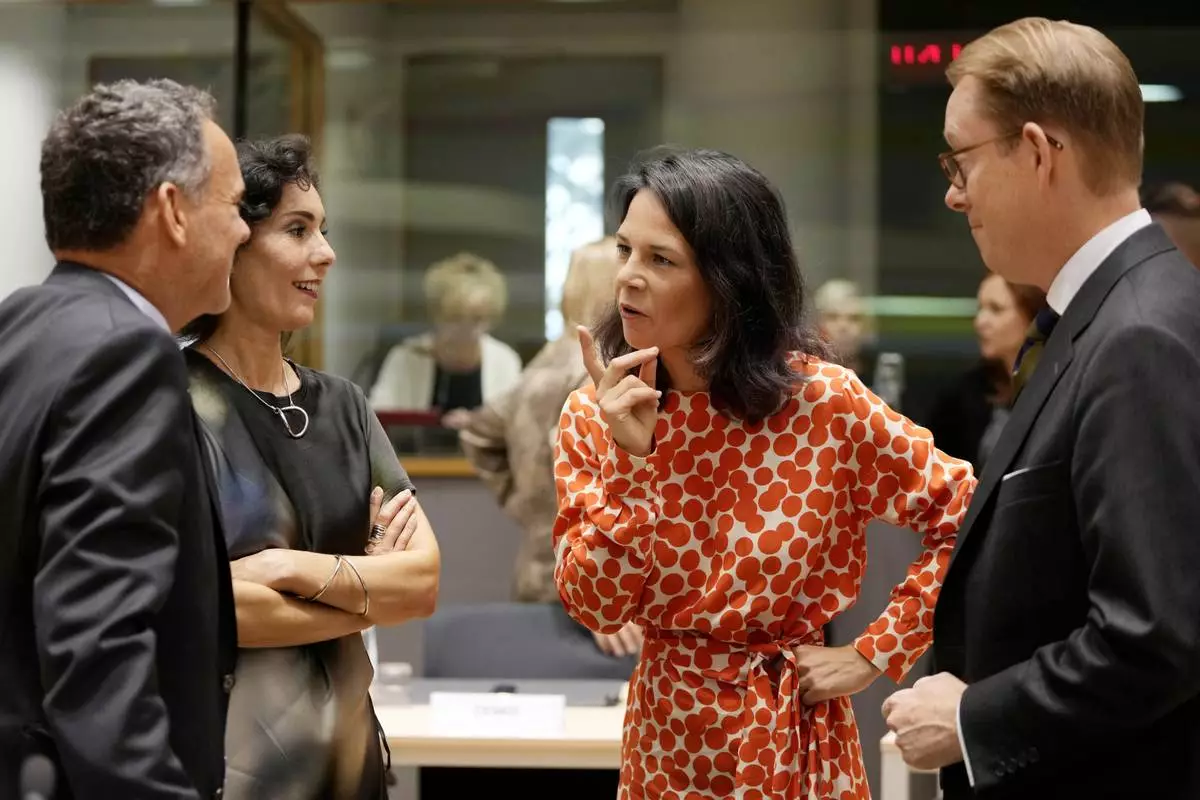
Germany's Foreign Minister Annalena Baerbock, center, speaks with from left, Netherlands' Foreign Minister Caspar Veldkamp, Belgium's Foreign Minister Hadja Lahbib and Sweden's Foreign Minister Tobias Billstrom during a meeting of EU foreign ministers at the European Council building in Brussels, Thursday, Aug. 29, 2024. (AP Photo/Virginia Mayo)
In one of the deadliest cult-related massacres ever, the remains of more than 430 victims have been recovered since police raided Good News International Church in a forest some 70 kilometers (40 miles) inland from the Kenyan coastal town of Malindi.
Seventeen months later, many in the area are still shaken by what happened despite repeated warnings about the church’s leader.
Autopsies on more than 100 bodies showed deaths from starvation, strangulation, suffocation, and injuries sustained from blunt objects. A gravedigger, Shukran Karisa Mangi, said he believed more mass graves were yet to be discovered. At least 600 people are reported missing, according to the Kenya Red Cross.
Here are some details about the case.
The evangelical leader of Good News, Paul Mackenzie, is accused of instructing his followers to starve to death for the opportunity to meet Jesus. Mackenzie pleaded not guilty to charges in the murders of 191 children, multiple counts of manslaughter and other crimes. If convicted, he would spend the rest of his life in prison.
Some in Malindi who spoke to The Associated Press said Mackenzie’s confidence while in custody showed the wide-ranging power some evangelists project even as their teachings undermine government authority, break the law, or harm followers desperate for healing and other miracles.
It’s not only Mackenzie, said Thomas Kakala, a self-described bishop with the Malindi-based Jesus Cares Ministry International, referring to questionable pastors he knew in the capital Nairobi. “You look at them. If you are sober and you want to hear the word of God, you wouldn’t go to their church. But the place is packed.”
A man like Mackenzie, who refused to join the fellowship of pastors in Malindi and rarely quoted Scripture, could thrive in a country like Kenya, said Kakala. Six detectives have been suspended for ignoring multiple warnings about Mackenzie’s illegal activities.
Kakala said he felt discouraged in his attempts to discredit Mackenzie years ago. The evangelist had played a tape of Kakala on his TV station and declared him an enemy. Kakala felt threatened.
Mackenzie, a former street vendor and cab driver with a high-school education, apprenticed with a Malindi preacher in the late 1990s. There, in the laid-back tourist town, he opened his own church in 2003.
A charismatic preacher, he was said to perform miracles and exorcisms, and could be generous with his money. His followers included teachers and police officers. They came to Malindi from across Kenya, giving Mackenzie national prominence that spread the pain of the deaths across the country.
The first complaints against Mackenzie concerned his opposition to formal schooling and vaccination. He was briefly detained in 2019 for opposing the government’s efforts to assign national identification numbers to Kenyans, saying the numbers were satanic.
He closed his Malindi church premises later that year and urged his congregation to follow him to Shakahola, where he leased 800 acres of forest inhabited by elephants and big cats.
Church members paid small sums to own plots in Shakahola. They were required to build houses and live in villages with biblical names like Nazareth, according to survivors. They said Mackenzie grew more demanding, with people from different villages forbidden from communicating or gathering.
During the COVID-19 pandemic, which witnesses said strengthened Mackenzie’s vision of the end times, the leader ordered more rigorous fasting that became even more stringent by the end of 2022. Parents were forbidden from feeding their children, witnesses said.
Like much of East Africa, Kenya is dominated by Christians. While many are Anglican or Catholic, evangelical Christianity has been spreading widely since the 1980s. Many pastors style their ministries in the manner of successful U.S. televangelists, investing in broadcasting and advertising.
Many of Africa’s evangelical churches are run like sole proprietorships, without the guidance of trustee boards or laity. Pastors are often unaccountable, deriving authority from their perceived ability to perform miracles or make prophecies. Some, like Mackenzie, can seem all-powerful.
Associated Press religion coverage receives support through the AP’s collaboration with The Conversation US, with funding from Lilly Endowment Inc. The AP is solely responsible for this content.
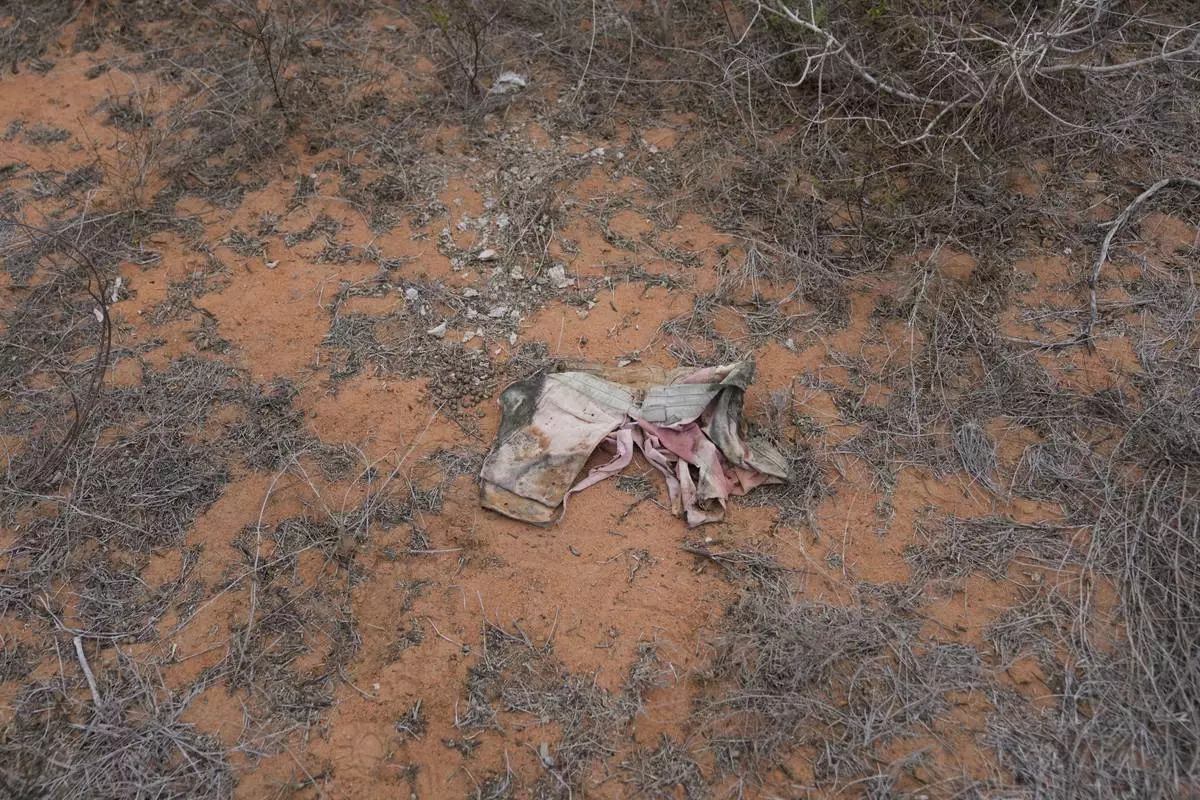
A piece of clothing lies in the bush near the forest where dozens of bodies were found in shallow graves in the village of Shakahola, near the coastal city of Malindi, in southern Kenya, on Thursday, Sept. 5, 2024. (AP Photo/Brian Inganga)





